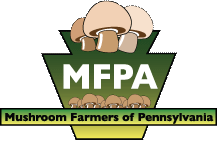From an early age Jim Yeatman knew exactly how he wanted to spend his working life: he wanted to grow mushrooms. “I never had a problem knowing what I wanted to do,” he said. His decision came as a youth while working both the mushroom and dairy components of his family farm. “We always had cows and my job was to milk. I knew I didn’t want to do that chore the rest of my life,” Jim quipped.
Bob Yeatman was as positive about his future plans as his brother. “When I was in high school,” he said, “I wasn’t sure what I wanted to do. When my older brother Artie started the dairy in 1950, I liked that and decided to go with him. After graduating from Penn State in Dairy Science, we doubled the size of the dairy.
The Yeatman’s connection to Chester County agriculture began in the early 1700s when the family first settled in Pennsylvania. In 1919, Arthur P. Yeatman, grandfather to Jim and Bob, purchased a dairy farm in London Grove Township, the site of the current mushroom company. “Around 1920, my grandfather started experimenting with mushrooms in an outbuilding next to their dairy barn,” Jim said of his family’s early years. “A lot of diary farmers got into the business since most of them needed a job in the winter months when there were no crops to harvest. At the time, growers grew one crop a year in the winter.”
In 1921, two mushroom houses were built and three more were constructed by 1923. The mushroom portion of the business continued to grow and thrive as A.P. Yeatman & Sons on the 125 acre farm. The diary business was discontinued about 1930, but revived 20 years later by Artie, the oldest brother. Artie, who also graduated from Penn State with a degree in Dairy Science, and Bob took care of the dairy operations while Jim and his father, Clarence, worked the mushroom part of the family business. A new partnership, C.P. Yeatman & Sons was then formed, which still exists today.
From 1950, when Artie started up the dairy again, until 1962, both the mushroom and dairy farms were in production. Then the farm was split by the construction of the Route 1 Bypass. At this time, three more mushroom houses were built.
Jim recalls his father saying that mushrooms did especially well in the depression because they were used to “dress up” food. “When we decided to drop the dairy and concentrate on mushrooms, we knew we wanted to put all of our efforts into one business,” Jim said. “At the time, mushrooms were subsidizing the dairy business. We put our proceeds from the sale of the dairy back into the mushroom farm.”
The Yeatman’s hope to continue the family’s agricultural tradition. “We’ve been growing mushrooms since 1921 and we want to continue far into the future,” Jim said. “Jerry (his son) and Tim (Hihn, Bob’s son in law) are fourth generation members of our family business.”
“I grew up in the oil industry, “Tim said. “I knew I wanted to go to business school. When I first started dating Jill (Bob’s oldest daughter), I swore I’d never work in the mushroom industry. The oil industry has a much faster pace.” He changed his mind when he and Jill had children. “You have to decide how to raise your family,” Tim said. “I didn’t want to travel all of the time; that’s what my father did. I wanted to be part of my children’s lives. Working on the farm requires long days, but if I wanted to leave at 3 p.m. to see my son’s game, I could. I might have to come back to work at night, but I am able to take part in those activities. It’s the quality of life that’s important to me.”
Tim said his son has expressed some interest in joining the family business and has worked at the farm on weekends since last fall. His daughter, who is 20 and is attending college, is looking at other options. “I don’t encourage or discourage them, “he said. “They know they have to earn a place in the business. They will have to work for someone else, receive training, go to college and bring value to the company.”
Jerry Yeatman started full time in 1991 after graduating from Penn State with a degree in Polymer Science. “I decided that I would rather work outdoors instead of in a basement laboratory, and so appreciated the opportunity to work on the family farm.”
Today, the operation encompasses about 200 acres in the West Grove and Oxford areas of Chester County. The farms have 43 mushroom houses and grow 10 million pounds per year. Almost half of those mushrooms are grown organically. “In 1989, we became the first certified organic mushroom farm in the country. We market the organic mushrooms under the Mother Earth brand,” said Tim. The U.S. Department of Agriculture (USDA) through Pennsylvania Certified Organic (PCO) certifies the mushrooms.
Jim, Bob, Tim and Jerry have all been very active in their community. Jim and Bob have both been members of the Avon Grove Lions Club since the early 1960s. One of the many services the Lions Club provides to all members of the community is the hospital equipment loan program. The Yeatman’s donate the entire upper portion of their barn to house all the equipment. Bob manages the loan program and maintains the supplies. “Bob also fixes the equipment,” Jim said. “He’s very mechanical.” Since last year, also stored in the barn are thousands of used books that are sold during a book sale held three times a year. These sales net between $4,000 and $5,000 for community projects. “We’re (Lions Club) also big supporters of K-9 Partners for Life,” said Jim.
Jerry continues the public service tradition. He has been a member of the London Grove Township Planning Commission since 2000. He is also on the Route 41 Executive Committee and the Route 41 Citizens Advisory Committee.
Tim has served on the Farm Bureau board and the Pennsylvania Certified Organic board since its inception.
Over the years, Jim said, the biggest change has come in the consolidation of farms. “It is the same with other forms of agriculture,” he said. “The smaller farmer drops out and farms become larger. You need increased productivity and volume to compete. Pricing hasn’t changed much over the years,” Jim said, “and farmers are surviving because of the increased yields.”
As for the future, Jerry said technology will play an even bigger role in mushroom farming. “Computers are used for a number of jobs, from climate control to order processing and marketing.” Composting is changing and advances are being made to reduce the odors from compost production. Jerry pointed out that mushroom farms also support other farmers in the area, including hay farmers. “We need a lot of hay,” he said. “We also use poultry manure and horse manure from local horse farms. These farmers certainly don’t want to see us go out of business.”
Challenges for mushroom farmers today include adequate labor supply, food safety requirements, competition, community relations issues and rising fuel costs, said Tim. “Our costs will increase tremendously because of the energy prices.”“All in all, mushroom farming is an exciting business. I believe our role is to pass along the company to the next generation. We are just stewards of this legacy,” said Tim. Bob agrees, “We’re maintaining a valuable asset to pass from generation to generation.”
Bob Yeatman was as positive about his future plans as his brother. “When I was in high school,” he said, “I wasn’t sure what I wanted to do. When my older brother Artie started the dairy in 1950, I liked that and decided to go with him. After graduating from Penn State in Dairy Science, we doubled the size of the dairy.
The Yeatman’s connection to Chester County agriculture began in the early 1700s when the family first settled in Pennsylvania. In 1919, Arthur P. Yeatman, grandfather to Jim and Bob, purchased a dairy farm in London Grove Township, the site of the current mushroom company. “Around 1920, my grandfather started experimenting with mushrooms in an outbuilding next to their dairy barn,” Jim said of his family’s early years. “A lot of diary farmers got into the business since most of them needed a job in the winter months when there were no crops to harvest. At the time, growers grew one crop a year in the winter.”
In 1921, two mushroom houses were built and three more were constructed by 1923. The mushroom portion of the business continued to grow and thrive as A.P. Yeatman & Sons on the 125 acre farm. The diary business was discontinued about 1930, but revived 20 years later by Artie, the oldest brother. Artie, who also graduated from Penn State with a degree in Dairy Science, and Bob took care of the dairy operations while Jim and his father, Clarence, worked the mushroom part of the family business. A new partnership, C.P. Yeatman & Sons was then formed, which still exists today.
From 1950, when Artie started up the dairy again, until 1962, both the mushroom and dairy farms were in production. Then the farm was split by the construction of the Route 1 Bypass. At this time, three more mushroom houses were built.
Jim recalls his father saying that mushrooms did especially well in the depression because they were used to “dress up” food. “When we decided to drop the dairy and concentrate on mushrooms, we knew we wanted to put all of our efforts into one business,” Jim said. “At the time, mushrooms were subsidizing the dairy business. We put our proceeds from the sale of the dairy back into the mushroom farm.”
The Yeatman’s hope to continue the family’s agricultural tradition. “We’ve been growing mushrooms since 1921 and we want to continue far into the future,” Jim said. “Jerry (his son) and Tim (Hihn, Bob’s son in law) are fourth generation members of our family business.”
“I grew up in the oil industry, “Tim said. “I knew I wanted to go to business school. When I first started dating Jill (Bob’s oldest daughter), I swore I’d never work in the mushroom industry. The oil industry has a much faster pace.” He changed his mind when he and Jill had children. “You have to decide how to raise your family,” Tim said. “I didn’t want to travel all of the time; that’s what my father did. I wanted to be part of my children’s lives. Working on the farm requires long days, but if I wanted to leave at 3 p.m. to see my son’s game, I could. I might have to come back to work at night, but I am able to take part in those activities. It’s the quality of life that’s important to me.”
Tim said his son has expressed some interest in joining the family business and has worked at the farm on weekends since last fall. His daughter, who is 20 and is attending college, is looking at other options. “I don’t encourage or discourage them, “he said. “They know they have to earn a place in the business. They will have to work for someone else, receive training, go to college and bring value to the company.”
Jerry Yeatman started full time in 1991 after graduating from Penn State with a degree in Polymer Science. “I decided that I would rather work outdoors instead of in a basement laboratory, and so appreciated the opportunity to work on the family farm.”
Today, the operation encompasses about 200 acres in the West Grove and Oxford areas of Chester County. The farms have 43 mushroom houses and grow 10 million pounds per year. Almost half of those mushrooms are grown organically. “In 1989, we became the first certified organic mushroom farm in the country. We market the organic mushrooms under the Mother Earth brand,” said Tim. The U.S. Department of Agriculture (USDA) through Pennsylvania Certified Organic (PCO) certifies the mushrooms.
Jim, Bob, Tim and Jerry have all been very active in their community. Jim and Bob have both been members of the Avon Grove Lions Club since the early 1960s. One of the many services the Lions Club provides to all members of the community is the hospital equipment loan program. The Yeatman’s donate the entire upper portion of their barn to house all the equipment. Bob manages the loan program and maintains the supplies. “Bob also fixes the equipment,” Jim said. “He’s very mechanical.” Since last year, also stored in the barn are thousands of used books that are sold during a book sale held three times a year. These sales net between $4,000 and $5,000 for community projects. “We’re (Lions Club) also big supporters of K-9 Partners for Life,” said Jim.
Jerry continues the public service tradition. He has been a member of the London Grove Township Planning Commission since 2000. He is also on the Route 41 Executive Committee and the Route 41 Citizens Advisory Committee.
Tim has served on the Farm Bureau board and the Pennsylvania Certified Organic board since its inception.
Over the years, Jim said, the biggest change has come in the consolidation of farms. “It is the same with other forms of agriculture,” he said. “The smaller farmer drops out and farms become larger. You need increased productivity and volume to compete. Pricing hasn’t changed much over the years,” Jim said, “and farmers are surviving because of the increased yields.”
As for the future, Jerry said technology will play an even bigger role in mushroom farming. “Computers are used for a number of jobs, from climate control to order processing and marketing.” Composting is changing and advances are being made to reduce the odors from compost production. Jerry pointed out that mushroom farms also support other farmers in the area, including hay farmers. “We need a lot of hay,” he said. “We also use poultry manure and horse manure from local horse farms. These farmers certainly don’t want to see us go out of business.”
Challenges for mushroom farmers today include adequate labor supply, food safety requirements, competition, community relations issues and rising fuel costs, said Tim. “Our costs will increase tremendously because of the energy prices.”“All in all, mushroom farming is an exciting business. I believe our role is to pass along the company to the next generation. We are just stewards of this legacy,” said Tim. Bob agrees, “We’re maintaining a valuable asset to pass from generation to generation.”
The Yeatman Family Farm Has Contributed To Chester County for more than 80 Years

Overview of Mushroom Farming l Economic Importance
Environmental Importance l Nutritional Importance l Farm Profile
Environmental Importance l Nutritional Importance l Farm Profile
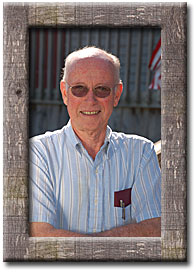
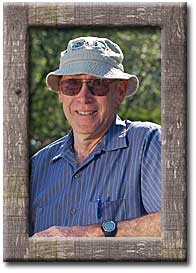
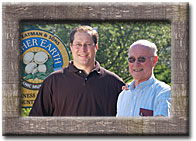
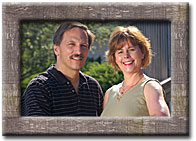
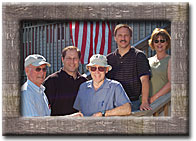
Bob Yeatman
Jim Yeatman
Jerry & Jim
Tim & Jill
The Family
